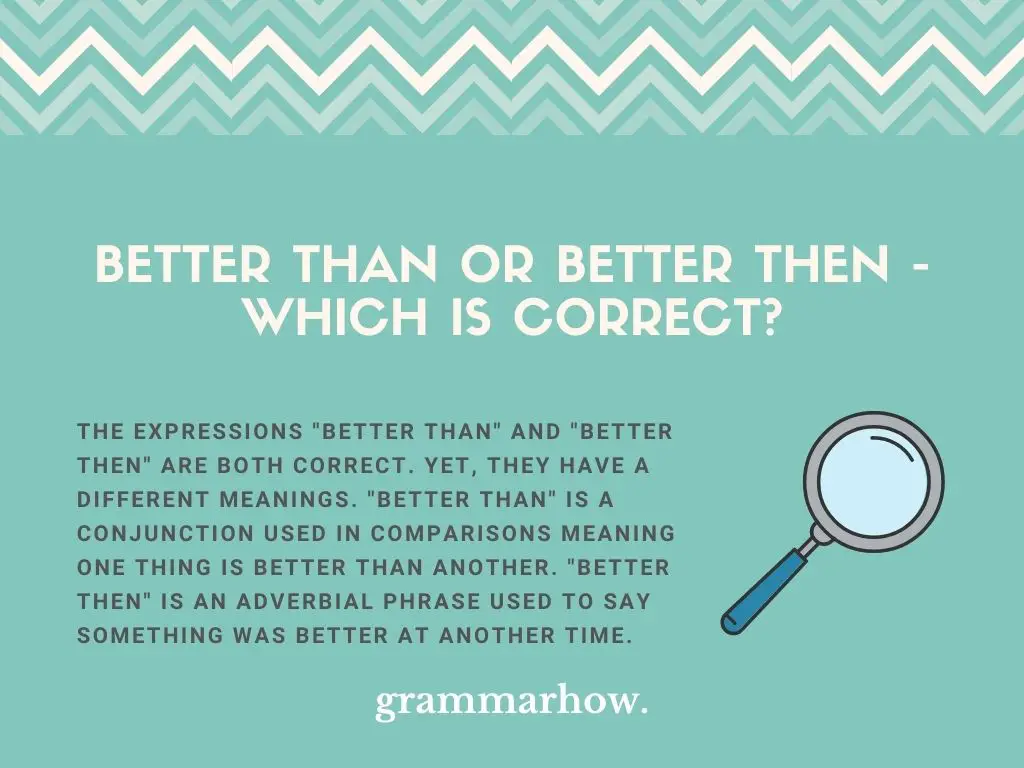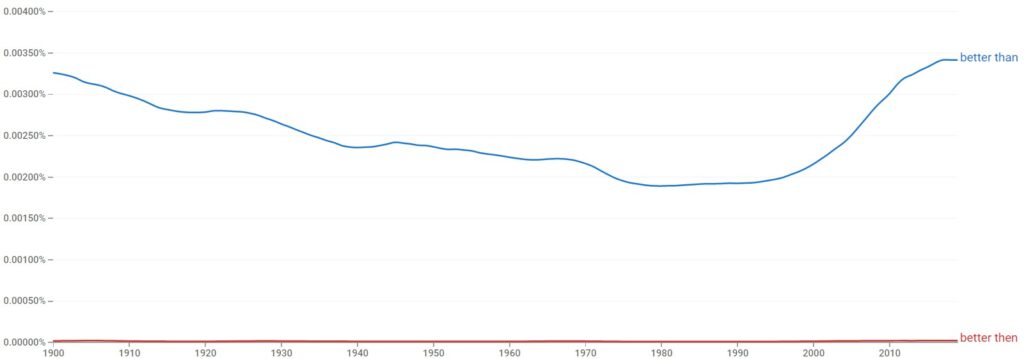Have you ever heard the expressions “better than” and “better then”? Do you feel confused about whether they can be used as synonyms or what is the difference between them? Well, you’ve come to the right place because all answers plus examples are just a couple of paragraphs away.
Better Than or Better Then – Which Is Correct?
The expressions “better than” and “better then” are both correct. Yet, they have a different meanings. “Better than” is a conjunction used in comparisons meaning one thing is better than another. “Better then” is an adverbial phrase used to say something was better at another time.

The use of “better than” and “better then” is not interchangeable; the phrases aren’t synonyms.
Moreover, the use of “than” as conjunction implies that the sentence is comparative. Therefore, it always requires the use of a comparative adjective; in this case, that comparative adjective is “better”.
On the other hand, “then” is an adverb that is used, among other things, to highlight the temporal relationship between two or more events. In this case, the word “better” means that these things being compared were or will be better in a different time than the present.
Better Than
The line “better than” is used in a comparative sentence to say that something or someone is better than another thing or someone. The inclusion of the conjunction “than” is indicative of comparison while the use of “better” defines the quality being compared (one thing is better than the other).
Let’s see how to use “better than” in a sentence with these examples:
- He was better than most playing football, that’s why they call him the GOAT.
- Being better than me in tennis doesn’t allow you to make fun of my skills.
- I knew I was better than him even before we started the fight, I don’t know what happened.
- Martha is better than Veronica at mathematics, but Veronica writes beautiful essays.
- Being better than Michael with the sword has made me famous!
- Nothing compares to being better than the rest playing the guitar; I feel like God on stage!
- Being better than you at driving is not something to be proud of, you’re no good at all.
Better Then
The line “better then” contains the adverb “then” which expresses, among other things, a temporal relationship between events. In this case, that relationship is that one event was or will be better than the event happening at another time. For example, we could say “football was better then than now.”
Let’s see how to use “better then” in a sentence with these examples:
- Everything was better then! People used to live in a slower rhythm and talk to each other.
- Are you telling me that it was better back then with no electricity? I can’t believe you.
- I remember everything being better then; I think I idealized my youth.
- But were you better then? Maybe you shouldn’t have ended that relationship after all.
- Racecar pilots were better then because they were maneuvering on such old machines.
- The place we live at was much better then, there wasn’t so much air pollution.
- Maybe it was all a chimera after all and we lived better then than we do now.
Which Is Used the Most?
When checking on word popularity, there is no tool more powerful than the Google Ngram Viewer.

According to this tool, “better then” has been used close to nothing for the last century. This trend for the word has been to this day maintained with very small nuances.
“Better than”, on the other hand, is at its all-time highest popularity level. Although it experienced a popularity loss between the 1940s and the early 2000s, it received a huge popularity boost that lasts until these days. Finally, that positive trend turned into a flat curve in the past five years.
Final Thoughts
The lines “better than” and “better then” are correct as long as they’re not used as synonyms or interchanged. The first talks about the relationship between two objects/people and the second between two different moments in time. Both represent a comparison in which one is better than the other.

Martin holds a Master’s degree in Finance and International Business. He has six years of experience in professional communication with clients, executives, and colleagues. Furthermore, he has teaching experience from Aarhus University. Martin has been featured as an expert in communication and teaching on Forbes and Shopify. Read more about Martin here.

